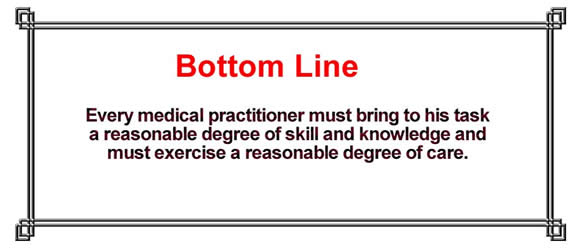Duty of Care
Different Physician and Health Care Professional (HCP) Standards of care
To measure competence of care:
"The medical practitioner is measured objectively against a reasonable medical person who possesses and exercises the skill, knowledge and judgment of the normal, prudent practitioner of his or her special group".
This is an objective measure and takes no account of the individuals own personality or intelligence etc.
As far as assessing the overall standard of care, the court will take into account
- The doctor
- education, experience and qualifications
- The degree of risk involved in the treatment
- The equipment, facilities and other available resources.
The HCP standard of care is based on what the "reasonable practitioner" would do in the circumstances.
Sylvester v. Crits
This was the first case to succinctly state the standard of care.
A tonsillectomy was performed on a 5 year old and he was anesthetised using ether. A spark caused the ether can to explode causing burns on the child's face. The question before the court was "did the defendant use appropriate precautions to prevent the ether can explosion?"
Ontario High Court ruled that the technique was in widespread use and the equipment was inherently dangerous. The case was dismissed against the defendant and the hospital, though it was mentioned that a better method might be used. No negligence found.
The Ontario court of Appeal ruled that the technique allowed a high concentration of ether and oxygen near the boys head - which was very dangerous
"Every medical practitioner must bring to his task a reasonable degree of of skill and knowledge and must exercise a reasonable degree of care. This is the same degree of skill and care that could be reasonably expected of a normal prudent practitioner of the same experience and standing. If he holds himself as a specialist then a higher degree of skill would be required than one who does not profess to be a specialist."
It was ruled that the defendant's conduct was an omission to take proper precautions in circumstances that any sensible layman was competent to determine.
RES IPSA LOQUITOR = The thing speaks for itself (accident speaks of negligence and the defendant was in charge at the time of the operation)
Supreme Court - Sylvester v. Crits et al., [1956] S.C.R. 991 (1956) confirmed decision by court of Appeal. There was finding of negligence in the procedure - even though the procedure at the time was standard practice.
Specialist v Family doctor
The standard of care expected of a doctor depends on his or her qualifications
A specialist is expected to possess and exercise a higher degree of skill than a general practitioner as far as diagnosis and treatment are concerned.
In general the greater the education and training, then the higher the expected standard of care. Inexperience is not taken into account and a novice surgeon is held to the same standards as an experienced one.
Vail v. MacDonald, [1976] 2 S.C.R. 825 Date: 1976-02-25
This surgeon involved had formal qualifications as a general surgeon with much experience in that area of medicine. He performed a closed reduction of a fractured ankle which led to limb ischemia and loss of the patient's foot. He had hospital priveleges in "emergency vascular problems" and was regularly involved in orthopedic work.
The trial court: Ruled that there was no evidence that the defendant was qualified to a higher degree than a family practitioner and so the standard of a family practitioner was applied.
The Court of Appeal: thought that the relevant standard should be higher than would be applied to a family doctor.
The Supreme Court of Canada: Ruled that the standard of care for this problem would be the same for a general practitioner or a general surgeon with orthopedic expertise and that the defendant failed to meet it.
Staff in Training and Students
Interns and residents may be found to be liable if they fail to meet the standard of care required. This would be the average level of competence of the group to which they belong.
Vancouver General Hospital v. Fraser, [1952] 2 S.C.R. 36
This is an important case regarding the liability of resident staff in training. After an accident the patient was seen in ER by two interns who examined him and requested imaging. They reviewed the X-rays themselves and did not consult with the on-call radiologist. They advised a family doctor on the telephone and discharged the patient (though he still had significant neck pain). The patient's death was attributed primarily to a dislocated fracture of his neck.
All three courts held that the residents failed to meet the expected standard of care which should be provided by physicians in their stage of training,
Mistakes by residents may implicate others such as supervising medical specialists and the hospital in which they are working. There may also be direct liability on the part of these same parties for failure to supervise a resident adequately.


